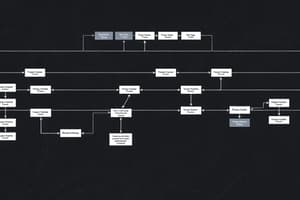Podcast
Questions and Answers
What is the primary purpose of a flowchart in problem-solving?
What is the primary purpose of a flowchart in problem-solving?
- To present data in tables
- To summarize findings in a report
- To outline a structure for organizing information
- To visually represent the steps in a process (correct)
Which type of flowchart specifically includes decision-making points?
Which type of flowchart specifically includes decision-making points?
- Complex flowchart
- Simple flowchart
- Branching flowchart (correct)
- Looping flowchart
In flowchart design, what function does a loop serve?
In flowchart design, what function does a loop serve?
- To represent a one-time task
- To branch into multiple outcomes
- To show repeated actions until a condition is met (correct)
- To indicate a point of failure
Which of the following is NOT typically represented in a flowchart?
Which of the following is NOT typically represented in a flowchart?
What is a primary feature of a simple flowchart?
What is a primary feature of a simple flowchart?
Flashcards are hidden until you start studying
Study Notes
Problem Solving Stages
- Problem-solving is a systematic approach to identifying and addressing challenges encountered in daily activities.
- Each stage involves careful consideration of the issue, potential solutions, and implementation.
Flowchart
- A flowchart is a visual representation of processes, showcasing each step in a systematic sequence.
- Typically features standardized symbols like ovals for start/end, rectangles for processes, and diamonds for decisions.
Simple Flowchart
- A simple flowchart illustrates the basic steps in a problem-solving process without complex branching or loops.
- Use simple shapes and clear labels for easy understanding and navigation.
Use of Branching (Decision) in Flowcharts
- Branching allows for decision points within a flowchart, indicating different paths based on yes/no or true/false outcomes.
- Essential for representing multiple scenarios and their respective actions in a problem-solving process.
Use of Loop in Flowcharts
- Loops in flowcharts demonstrate repeated actions or processes until a specific condition is met.
- Facilitates understanding of iterative processes, ensuring clarity on how many times a step may repeat.
Advantages of Flowcharts
- Enhance comprehension of problems and their solutions by providing clear visualization.
- Aid programmers by illustrating required steps, making it easier to develop and implement solutions.
- Serve as an educational tool for explaining processes across various fields or activities.
Studying That Suits You
Use AI to generate personalized quizzes and flashcards to suit your learning preferences.




